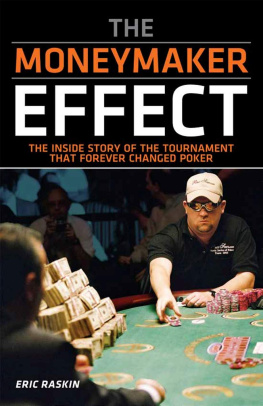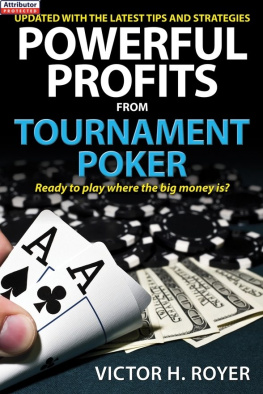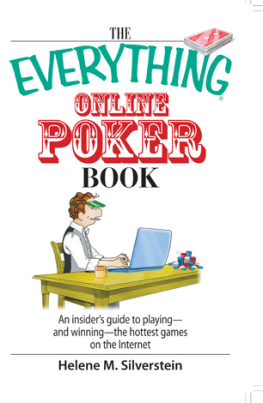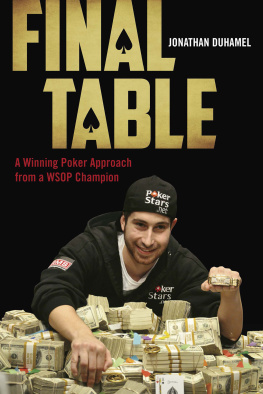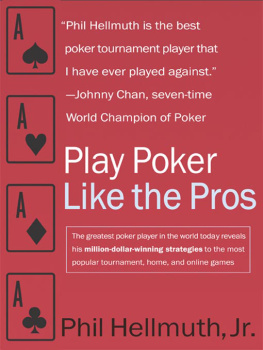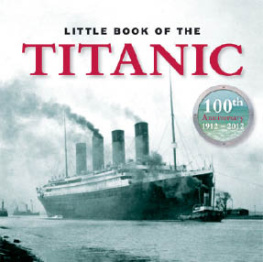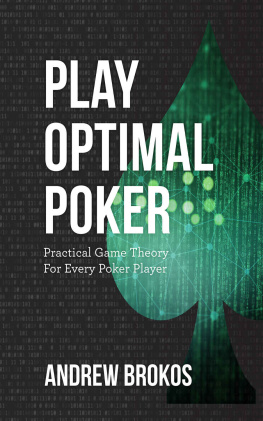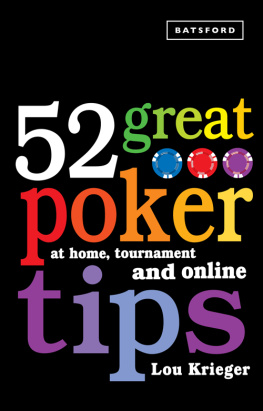The
Moneymaker Effect
The
Moneymaker Effect
The Inside Story
of the Tournament
That Forever Changed Poker
Eric Raskin
HUNTINGTON PRESS
Las Vegas, Nevada
The Moneymaker Effect
The Inside Story of the Tournament
That Forever Changed Poker
Published by
Huntington Press
3665 Procyon Street
Las Vegas, Nevada 89103
Phone: (702) 252-0655
email:
Copyright 2014, Eric Raskin
eBook ISBN: 978-1-935396-11-6
Print ISBN: 978-1-935396-56-7
Cover Design: Will Tims
Production & Design: Laurie Cabot
Portions of this book were originally published by Grantland.com and are used with permission.
All rights reserved. No part of this publication may be translated, reproduced, or transmitted in any form or by any means, electronic or mechanical, including photocopying and recording, or by any information storage and retrieval system, without the express written permission of the copyright owner.
Dedication
For Olivia and Eli
May they always have both skill and luck working in their favor.
Acknowledgments
The most logical place to start in thanking people for making this book possible is with the 34 members of the poker community who sat for the interviews that became this oral history. Without their insights, opinions, and behind-the-scenes stories, there would be no book.
Among those 34 interview subjects, there are a handful worth singling out. First, thank you to Chris Moneymaker for his open, honest, and enthusiastic participation across several lengthy sessions. Without Chris involvement, the whole project would have been a non-starter.
Thank you to Nolan Dalla and Matt Savage for not only their stories and remembrances, but for helping to put me in touch with other interview subjects. Along similar lines, thank you to ESPN.coms Andrew Feldman for facilitating one key interview.
And thank you to Brian Koppelman for both his quotes in the oral history and his astute, lively Foreword. It is an honor to have Brians byline in my book.
Thank you to my publisher, Anthony Curtis of Huntington Press, for believing in me and this project from the very start. Anthonys perseverance and willingness to be the bad guy, while allowing me to preserve my good guy status, were invaluable throughout the trying process of obtaining the rights to publish my work in book form. Also, thank you to my editor, Deke Castleman, for his hard work and his perceptive suggestions that helped make the final product superior to what Id originally envisioned.
Backing up a step in the process, I have to thank the folks at Grantland for their guidance and support before I knew Id be turning this into a book. Thank you to Bill Simmons and Dan Fierman for (a) introducing me to the world of oral history writing, and (b) giving my pitch for a 2003 World Series of Poker oral history article the green light. And a huge thank you to my Grantland editor Rafe Bartholomew, who did a tremendous job tightening up my original article for the site and also was a key advocate for me in my efforts to expand it into a book.
I must thank the people who were instrumental in bringing me into the world of poker journalism in the first place, original ALL IN magazine publishers Bhu Srinivasan and Kasey Thompson. A tip of the cap to my long-time partner in poker-mag production Will Tims, without whom I might not have survived in this industry as long as I have, and to Scott Tharler, who was vital in speeding up my poker learning curve. Also, much gratitude to two of the best poker writers I know, Jonathan Grotenstein and Storms Reback, whose WSOP history book made my research on this project considerably easier.
Knowing your subject matter is secondary to knowing how to write and edit, so I must thank my mentors on those fronts, Nigel Collins and Stu Saks. An oral history is primarily an exercise in interviewing and editing, and I learned the ropes of those disciplines under Nigel and Stus expert guidance.
The most important thank you of all goes to my family, starting with my amazing wife Robin, who put up with a lot of working weekends and even a working vacation, so that I could complete this book. She did a lot of one-on-two parenting over the past year, and for that Im extremely grateful.
Thank you to my kids, Olivia and Eli, for motivating, inspiring, and entertaining me. Thank you to my parents, Meryl and Ray, for literally everything, and to Fred, Ari, Dave, Phyllis, Bud, Mark, and too many other people to list for their love and support.
And, finally, thank you to Rodney J. Raskin for giving me an excuse to get out of the house and away from my work for at least a few minutes every day, and for generally keeping his barking to a minimum when I needed to concentrate.
Contents
Foreword
Poker has never been innocent. As long as games have been spread and chips flung across tables, card players have lost fortunes, been cheated, quit in fury, and returned only hours later, ready to bluff off the family farm to some guy named Doc or Red or Dolly.
But there was a time, not too long ago, when there was a charming innocence about the game, the professionals who played it for a living, and the amateurs who, once a year, traversed the country to compete against the pros in the World Series of Poker (WSOP) in Las Vegas, Nevada.
This book is about the moment that charming innocence crescendoed before disappearing forever.
Eric Raskin has found the inflection point, the sweet spot, the absolute instant that poker tipped into a cultural obsession, became a giant business, and brought waves and waves of new players into the online poker rooms that turned out, in some cases, to be worldwide criminal enterprises.
Of course, no one knew any of that was in the offing when Chris Moneymaker set out from Nashville for Las Vegas on the freeroll of a lifetime in the summer of 2003. The WSOP tournament organizers did know theyd have a full field, probably the largest in history. They knew that online poker had grown the game and made its rules and rituals accessible to a diverse group of enthusiasts. And they knew that the clash between online specialists and brick-and-mortar regulars could lead to memorable hands, huge swings of fortune, and surprising, dramatic outcomes. But even they were amazed by how huge and electrifying it turned out to be.
In The Moneymaker Effect, those tournament organizers, along with the railbirds who watched in person and many of the contenders who won or lost at the tables that week, are the ones telling you the story. Which is good news. Poker players sit for long hours, folding, waiting, jawing at one another, and, as a way to avoid falling asleep at the table, many have turned themselves into compelling raconteurs. So what Raskin has done here, turning the storytelling over to the storytellers who were right there in the middle of it, is inspired. I came to this material knowing many of the particulars and still found myself turning the pages quickly and racing to the end.
Its no spoiler to reveal that Chris Moneymaker wins the 2003 World Series of Poker. Anyone interested enough to be reading these words already knows that. Which says something about how big an event this little card tournament became, how prominent a place it has in our collective consciousness.
Moneymakers victory at the 2003 WSOP was a rapturous moment for Moneymaker most of all, but also for sports fans, poker players, and the poker business. It was also the dividing line between so much that was good about poker and everything that came after.
Eric Raskins wonderful book puts us there, where we can linger as long as we like as Chris defies the odds, his limitations, and better playersand holds off the uneasy future we know he has to livein the shadow of pokers most glorious year.
Next page
